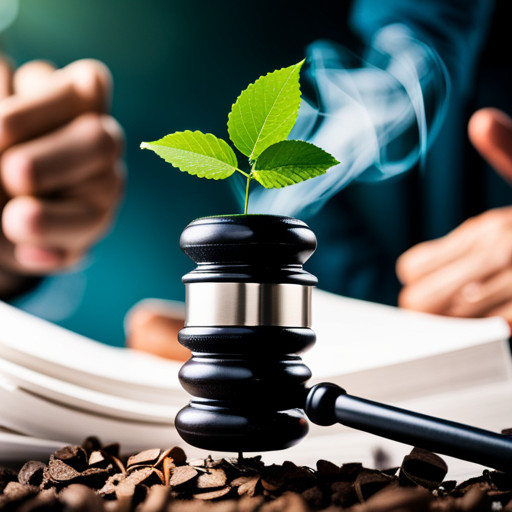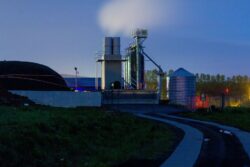Chemical Exposure Class Actions: Environmental Justice in Action
In the realm of environmental mass tort cases, the selection of a suitable legal representative is a critical decision with potential long-term implications. This article aims to elucidate the process of choosing the correct lawyer for such intricate lawsuits.

The discussion will encompass the understanding of mass tort cases, the importance of specialization, the evaluation of experience levels, and the assessment of track records.
Further, it will delve into the necessity of notable communication skills, the determination of legal fees, and the value of availability and accessibility.
The article will also explore the assessment of professionalism and ethics, ultimately guiding the reader towards making the final decision.
The goal is to equip individuals with comprehensive knowledge and understanding, enabling them to make informed decisions when selecting a legal representative for their environmental mass tort lawsuit.
Key Takeaways
- Choosing a lawyer specialized in mass tort environmental cases increases the chances of a favorable outcome.
- Evaluating a lawyer's experience and track record is crucial for assessing their competency and credibility.
- Communication skills are essential for lawyers in complex mass tort environmental lawsuits.
- Consider the lawyer's personality, reputation, and professionalism when making a decision.
Understanding Mass Tort Cases
A comprehensive understanding of mass tort cases, typically involving numerous plaintiffs against one or a few corporate defendants, is crucial when navigating the complex landscape of environmental lawsuits. These lawsuits often arise from instances where a corporation's actions have caused widespread harm to the environment and subsequently, to the individuals residing in the affected regions. This harm, often in the form of pollution or other forms of environmental degradation, may result in significant health issues or property damage for a large group of people.
Tort legislation basics provide the legal framework for such cases. Essentially, a tort is a civil wrongdoing that causes harm or injury and can be grounds for a lawsuit. There are several types of torts, with the most common being negligence, intentional torts, and strict liability torts. Negligence occurs when an entity fails to exercise reasonable care, leading to injury or damage. Intentional torts, on the other hand, involve deliberate actions that cause harm. Strict liability torts pertain to cases where the defendant is held liable regardless of intentions or negligence. In the context of environmental lawsuits, strict liability often applies, as the damage is typically a direct result of the defendant's actions.
Within the scope of mass tort cases, understanding these types of torts is imperative. It allows for a more comprehensive analysis of the case and a better strategy for achieving justice. Moreover, it aids in choosing the right lawyer, one who is well-versed in tort legislation and has experience in managing mass tort environmental lawsuits. This knowledge base is vital to ensure the best possible outcome for the affected parties.
Importance of Specialization
Selecting an attorney with a specialization in mass tort environmental cases significantly increases the chances of a favorable outcome. This is largely due to the complex nature of these cases, which often involve numerous plaintiffs against one or a few defendants. These cases require a deep understanding of both environmental law and mass tort litigation, a combination of expertise not every lawyer possesses.
The Bar Association guidance stresses the importance of hiring a lawyer with the appropriate specialization. It underlines that a lawyer specializing in mass tort environmental lawsuits has the necessary legal education requirements to successfully navigate such complex cases. They are equipped with an understanding of the intricate intersection between environmental regulations, tort law, and the procedural complexities of mass tort cases.
This specialized knowledge is gained through rigorous legal education and practical experience. Lawyers focusing on this area typically have additional coursework and training in environmental law, tort law, and litigation. This knowledge base is supplemented by hands-on experience, often gained through internships, clerkships, or junior associate roles in law firms specializing in mass tort environmental lawsuits.
Moreover, a specialized attorney can provide strategic advice on the best course of action, based on past case precedents and a deep understanding of the legal landscape. They can navigate the complexities of negotiations, settlements, and trial preparations, providing a robust legal defense.
Recognizing the critical role of specialization in handling mass tort environmental lawsuits, it becomes apparent that choosing a lawyer with this specific expertise is not just a preference but a necessity. Only through such specialized knowledge and experience can one expect a strong representation and increased chances of a successful resolution.
Evaluating Experience Levels
Evaluating the level of experience held by a potential legal representative forms a pivotal part of the process, particularly in relation to their track record with cases similar to yours. This involves an examination of the lawyer's legal credentials, including educational background, professional associations, and certifications. The significance of this evaluation cannot be understated; it provides an insight into the lawyer's competency and credibility.
A lawyer's experience in handling cases similar to yours is a critical factor to consider. Mass tort environmental lawsuits are complex and demanding, requiring a highly specialized skill set. It is essential to assess whether the lawyer has achieved past verdicts that have favored their clients in such cases. A successful track record not only points to the lawyer's capability to provide effective representation, but it also demonstrates their ability to navigate the intricacies of environmental law.
The evaluation should also extend to the lawyer's strategic approach. This involves assessing their ability to formulate, articulate, and execute a compelling legal strategy. A lawyer's strategic approach often reveals their understanding of the law's nuances and their ability to adapt to changing circumstances.
An examination of a lawyer's professional reputation within the legal community can also provide valuable insights. This can be ascertained through peer reviews, client testimonials, and legal publications. The lawyer's reputation can often reflect their commitment to ethical practices, client representation, and their dedication to achieving favorable outcomes.
Assessing a potential legal representative's level of experience is a multi-faceted task. It involves a careful study of their legal credentials, past verdicts, strategic approach, and professional reputation. This comprehensive evaluation is essential in ensuring the selection of a capable and reliable lawyer for a mass tort environmental lawsuit.
Assessing Track Record
Understanding the importance of a legal representative's track record, particularly in cases similar to yours, is paramount when considering their suitability for representation. An attorney's track record, including the number of cases won, settled, or lost, can provide insights into their capability to handle complex mass tort environmental lawsuits.
An exemplary track record is indicative of the lawyer's ability to navigate the intricate legal landscape, devise effective legal strategies and secure favorable outcomes. An attorney's past performance in handling lawsuits similar to yours can be a testament to their expertise, strategic thinking, and tenacity. It is essential to consider the depth of their experience in environmental tort cases, not just the breadth of their overall legal practice.
Evaluating an attorney's track record involves analyzing case outcomes. An attorney who consistently secures favorable verdicts or settlements for their clients demonstrates a strong understanding of the legal issues at stake, a high level of skill in litigation, and an adeptness in employing potent legal strategies. It is essential to inquire about the lawyer's legal strategy in previous similar cases, how they developed it, and how it contributed to the case's outcome.
Additionally, their track record can provide insight into their reputation in the legal community, which can influence the proceedings in your case. A positive reputation can enhance negotiation power, potentially leading to more favorable settlements.
Assessing the potential legal representative's track record is a crucial step in ensuring that they possess the requisite skills, experience, and strategic capabilities to effectively represent your interests in a mass tort environmental lawsuit. A thorough evaluation can provide assurance that your case is in capable and experienced hands.
Communication Skills Worth Noting
In the complex realm of legal proceedings, the value of superior communication skills in an attorney cannot be overstated. This holds particularly true for mass tort environmental lawsuits, which can be intricate and demand a lawyer with the ability to convey complex information in an accessible manner. The attorney's communication proficiency, both verbal and non-verbal, plays a pivotal role in these cases.
Effective communication in this context extends beyond the spoken word. Non-verbal cues, such as body language, eye contact, and facial expressions, are equally consequential. These cues can provide a wealth of information about the attorney's level of engagement, understanding, and empathy. A lawyer who maintains eye contact, for instance, can convey a sense of confidence and assurance, while attentive body language can demonstrate genuine interest and understanding of the client's case.
Active listening, another vital aspect of communication, is a skill that separates an exemplary lawyer from the rest. It involves not only hearing what the client is saying but also understanding and interpreting their words correctly. An attorney adept at active listening will show a sincere interest in the client's concerns, ask relevant questions for clarity, and provide thoughtful responses.
Effective communication skills, in essence, are indicative of an attorney's capacity to advocate convincingly, negotiate effectively, and build trusting relationships with clients. Therefore, when choosing a lawyer for a mass tort environmental lawsuit, it becomes imperative to evaluate their communication skills, including their ability to utilise non-verbal cues and demonstrate active listening. These factors will contribute to a successful legal partnership and potentially more favourable outcomes in the legal proceedings.
Checking Client Testimonials
Assessing client testimonials provides a direct insight into the attorney's competence, professionalism, and approach towards handling complex legal matters. These testimonials often encapsulate the experiences of past clients, offering invaluable insights into the attorney's aptitude for handling mass tort environmental lawsuits.
The testimonial authenticity is of paramount importance while scrutinizing the credibility of an attorney. Authentic testimonials are characterized by detailed accounts of the client's experience, the attorney's approach, and the outcome of the lawsuit. They also often mention specific instances showcasing the attorney's skill, thereby providing potential clients with a realistic expectation of the attorney's capabilities.
However, it is advised to exercise caution while interpreting testimonials as they are subjective and might not necessarily reflect the attorney's overall competence. A single negative testimonial should not overshadow multiple positive testimonials, and vice versa. The focus should be on identifying consistent patterns in the testimonials, which will provide a more accurate representation of the attorney's abilities.
Public perception plays a crucial role in the selection process. An attorney with a positive public perception is likely to be more competent and reliable. This perception is often built over years of consistent performance and successful handling of mass tort environmental lawsuits. Therefore, it is recommended to consider an attorney with a positive public perception, as reflected in the testimonials.
While assessing client testimonials, it is essential to consider both the quantity and quality. A large number of testimonials might indicate a high level of client satisfaction, while the quality of testimonials speaks volumes about the attorney's professionalism and dedication. Therefore, client testimonials serve as an effective tool for evaluating the suitability of an attorney for a mass tort environmental lawsuit.
Determining Legal Fees
Establishing a clear understanding of the legal fees is an invaluable step when engaging an attorney for complex legal matters such as mass tort environmental lawsuits. The financial implications of such legal battles can be substantial, and hence, it is imperative to assess the feasibility of the lawyer's fee structure in conjunction with the potential monetary compensations.
Legal fees often vary depending on the complexity of the lawsuit, the attorney's experience, and the geographic location. Typically, attorneys may charge on an hourly basis, a flat fee, or a contingency fee basis. In mass tort environmental lawsuits, lawyers often use a contingency fee structure, where the attorney's payment is a percentage of the compensation received. This structure can be beneficial as it removes the risk of paying high upfront legal fees, especially in situations where the outcome is uncertain.
Understanding the fee structure not only aids in budget planning but also allows for negotiating costs. Negotiating the fee can potentially lead to a reduction in the overall legal costs. It is crucial to discuss the fee structure in detail, including the possibility of any additional costs that may arise during the course of the lawsuit. Such costs could include administrative fees, court filing charges, and costs related to expert witnesses.
Reaching clarity on the financial aspects of the legal engagement before proceeding with a lawsuit can prevent any unexpected financial burdens in the future. Therefore, a comprehensive understanding of legal fees, their structure, and the ability to negotiate costs can prove to be a decisive factor in choosing the right lawyer for a mass tort environmental lawsuit.
Availability and Accessibility
Navigating the rigors of legal proceedings necessitates an attorney's consistent availability and accessibility, crucial elements that significantly influence the progression and outcome of the case. The decision to engage a lawyer in a mass tort environmental lawsuit is a significant one, and the chosen attorney must demonstrate commitment through open communication and readiness to address client's needs promptly.
Office location and flexible hours play a significant role in reinforcing this commitment. An attorney's office location can substantially impact the frequency and quality of client meetings. It is, therefore, recommended to select a lawyer whose office is conveniently located, ideally in proximity to the client's residence or workplace. This arrangement facilitates regular, face-to-face consultations, which can provide a greater sense of security and understanding of the lawsuit proceedings.
Furthermore, an attorney's operating hours also carry significant weight in the selection process. Legal proceedings often require immediate attention to urgent matters, and a lawyer who offers flexible hours can provide this requisite responsiveness. An attorney who can adjust their schedule to meet the client's needs, including availability outside regular office hours, can offer exceptional legal service and contribute to a favorable lawsuit outcome.
Therefore, the importance of an attorney's availability and accessibility in a mass tort environmental lawsuit cannot be understated. The lawyer's office location and flexible hours are fundamental considerations in the selection process. These factors not only ensure smooth communication but also reflect the attorney's commitment to the client's case, thereby potentially influencing the lawsuit's successful resolution.
Assessing Professionalism and Ethics
In the realm of legal endeavors, a profound understanding of an attorney's adherence to professional standards and ethical codes of conduct is indispensable. The selection of a lawyer for a mass tort environmental lawsuit is no exception to this rule. It is crucial to assess the professionalism and ethical standards of the lawyer to ensure an effective and fair representation.
Professional conduct in the legal field entails a commitment to maintaining a high level of competence, confidentiality, and integrity. These principles should be reflected in the lawyer's interactions with clients, the court, and other legal professionals. The lawyer should possess a comprehensive understanding of the legal and ethical issues related to mass tort environmental lawsuits. This includes being well-versed in the law and procedures, demonstrating objectivity and fairness, and respecting the rights and interests of all parties involved.
Ethical dilemmas often arise in such cases due to the complexity of the issues at stake. The lawyer should be adept at navigating these dilemmas while upholding the highest standards of professional and ethical conduct. This could involve conflicts of interest, issues of confidentiality, and questions of legal and moral responsibility. The lawyer's ability to handle these dilemmas effectively and ethically is a valuable indicator of their suitability for your case.
Assessing a lawyer's adherence to professional standards and ethical codes of conduct extends beyond their legal expertise. It encompasses their approach to client representation, their handling of sensitive information, and their ability to negotiate and resolve disputes. All these factors are instrumental in ensuring effective representation in a mass tort environmental lawsuit.
Making the Final Decision
After careful evaluation of potential candidates based on their expertise, experience, reputation, professionalism, and ethics, the final step involves making an informed decision on legal representation for the complex litigation process. This process requires a comprehensive understanding of the legal landscape and keen attention to the lawyer's personality. The chosen attorney should not only have the legal acumen but also the personality traits that fit well with the client's requirements and expectations.
The legal process of a mass tort environmental lawsuit is often stressful and intricate. It requires a lawyer with resilience and determination, able to navigate through the intricacies of the case. The personality of the attorney is fundamental in this regard. An attorney with a strong personality, known for tenacity and thoroughness, would be a valuable asset.
Moreover, the lawyer's personality should align with the client's communication style and comfort level. An attorney who is approachable, patient, and empathetic can make the legal process less daunting. It is beneficial if the attorney is assertive yet respectful, a strong negotiator yet fair, and remains calm under pressure.
The decision on the right lawyer should not be rushed. It may involve several consultations, research, and taking into consideration recommendations from trusted sources. It is also paramount to consider the financial implications of hiring the attorney. The cost should be commensurate with the services provided, and the payment structure should be clear and fair.
Deciding on the right legal representation is a crucial step in the pursuit of justice in a mass tort environmental lawsuit. Hence, a sound decision should be made after a thorough evaluation of the lawyer's expertise, experience, reputation, personality, and professionalism.
Frequently Asked Questions
What is the length of a typical mass tort environmental lawsuit?
The timeline of a mass tort environmental lawsuit is highly variable, often spanning several years due to the complexity of the case. Factors influencing the duration include the number of plaintiffs involved, the intricacy of the environmental harm alleged, and the protracted nature of the legal proceedings.
Therefore, estimating a typical length is challenging. However, understanding this substantial time commitment is crucial for those considering their legal options in a mass tort environmental case.
How can I protect myself from potential scams or fraudulent lawyers?
Detecting scams and avoiding fraudulent representation requires vigilance and research. Ensure the attorney is licensed to practice in your state by verifying with the state bar association.
Be wary of lawyers who solicit you first, as this is often a red flag. Additionally, avoid lawyers who guarantee a specific outcome or ask for payment upfront.
Always review any documents thoroughly before signing and consult with a trusted advisor if something seems questionable.
Are there any specific personality traits or soft skills that may be beneficial in a lawyer handling mass tort environmental lawsuits?
In mass tort environmental lawsuits, certain personality traits and soft skills in lawyers can significantly enhance their effectiveness.
A lawyer's empathy is paramount as it facilitates understanding the plight of the victims, hence advocating passionately.
Additionally, negotiation skills are vital for reaching satisfactory settlements.
These skills, coupled with a robust understanding of environmental law, equip a lawyer to navigate the complexities of mass tort environmental lawsuits effectively, thereby presenting a compelling case for their clients.
How does the lawyer handle the emotional stress and pressure that come with these types of cases?
An adept lawyer in mass tort environmental lawsuits often employs effective coping mechanisms and stress management strategies. These may include maintaining a balanced lifestyle, seeking professional counseling, and practicing mindfulness techniques.
The ability to handle emotional stress and high-pressure situations is an essential quality, as it ensures the lawyer's mental fortitude and resilience in navigating the complexities and demanding nature of mass tort environmental lawsuits.
Therefore, an individual's stress management approach is a crucial consideration when selecting a lawyer for such cases.
Can I switch lawyers midway through the case if I’m not satisfied with the services?
Termination of legal representation during an ongoing case is possible, however, it may result in termination consequences. The choice to switch should not be taken lightly, considering potential impacts on case progression and costs.
Therefore, thoroughness in initial lawyer selection is crucial to avoid dissatisfaction. It is advisable to research, interview several candidates, and understand their expertise in handling mass tort environmental lawsuits before making a selection. This will increase the likelihood of a satisfactory legal representation.
Conclusion
In conclusion, selecting the appropriate legal representation for a mass tort environmental lawsuit necessitates careful consideration of several factors. These include:
- Understanding mass tort cases
- Specialization
- Experience levels
- Track record
- Communication skills
- Legal fees
- Availability
- Accessibility
- Professionalism
- Ethics
The final decision should reflect a comprehensive evaluation of these elements, ensuring that the chosen lawyer possesses the necessary skills and attributes for successful litigation in complex and high-stakes environmental cases.

This post has been generated by AI and was not reviewed by editors. This is Not legal advice. Please consult with an attorney.




